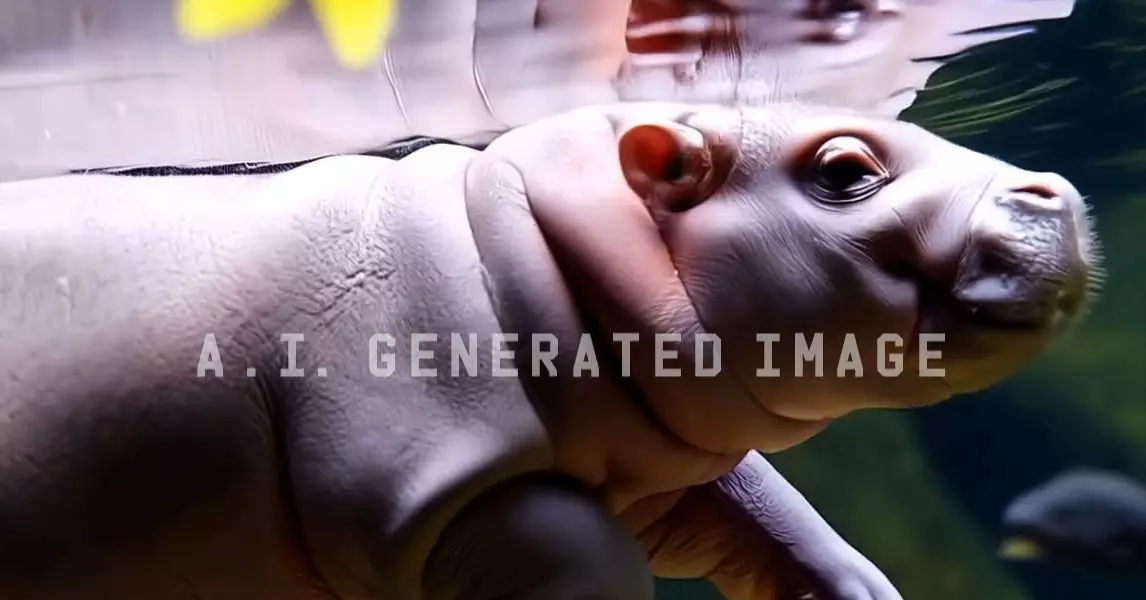The rapid evolution of technology continues to redefine how we interact with media, especially in the realm of artificial intelligence. In a recent announcement, Meta unveiled its latest innovation: Movie Gen, a media-focused AI model capable of generating hyper-realistic video and audio clips. This tool could potentially revolutionize content creation, but its introduction raises several important questions and concerns.
Meta showcased the capabilities of Movie Gen at its recent Meta Connect event, where the company displayed several captivating 10-second video clips. Notably, one standout example featured a baby hippo swimming playfully, reminiscent of scenes from beloved children’s movies. However, Movie Gen promises more than just entertaining visuals. The AI model’s ability to edit existing clips is particularly noteworthy, allowing users to modify specific elements within a video. For instance, one demonstration illustrated transforming a woman in a VR headset to appear as though she sported steampunk binoculars. This level of targeted enhancement emphasizes Movie Gen’s potential to create personalized and unique content.
Furthermore, Movie Gen doesn’t merely focus on visuals; it incorporates sound as well. Audio clips generated alongside the videos reflect a high degree of intricacy, with sounds that add depth to various scenes. Clips included a man standing near a waterfall with realistic splashes and symphonic undertones, demonstrating the model’s versatile audio capabilities. Such features position Movie Gen as a robust tool for creators looking to produce immersive multimedia experiences.
Delving deeper into the technical aspects, Movie Gen boasts an impressive parameter count: 30 billion for the Video model and 13 billion for Audio. These figures indicate the depth of learning and capability embedded within the system. For context, Llama 3.1, one of Meta’s prominent language models, has 405 billion parameters, underscoring the scale and complexity of Meta’s AI initiatives.
Meta claims that Movie Gen can generate high-definition videos lasting up to 16 seconds, asserting that it surpasses competing models in terms of video quality. This performance claim will need scrutiny as comparative benchmarks emerge. The AI landscape is quite competitive, with various companies racing to outdo one another in technological advancements.
While the potential for creativity is exciting, Movie Gen raises critical concerns about its training data. Meta has only vaguely mentioned that Movie Gen has been built upon licensed and publicly available datasets. However, in the broader conversation around generative AI, the sourcing of training data remains a contentious issue. The lack of transparency regarding the specifics of this data risks fostering mistrust among creators and consumers alike. Issues such as copyright infringement and the ethics of harvesting data without explicit consent must be addressed as the industry matures.
Looking forward, the integration of Movie Gen into Meta’s social media platforms—like Facebook, Instagram, and WhatsApp—seems likely. The company has a history of incorporating its technological advancements into user-facing products. However, the timeline for broad access to Movie Gen remains vague, with Meta hinting at a “potential future release.”
In contrast to Meta, rival companies like OpenAI and Google also face challenges in rolling out similar models. OpenAI’s Sora, announced earlier this year, has yet to see public access. This pattern of cautious release suggests a broader hesitance in the industry about unleashing powerful generative tools.
While mainstream tech giants weigh the implications of their AI offerings, smaller startups like Runway and Pika have already begun to make waves, allowing early adopters to experiment with creative potentials. Tools offered by these companies provide exciting options for individuals eager to push the boundaries of visual entertainment.
The launch of Movie Gen is yet another step in the ongoing evolution of AI-driven media. Its innovative features and technical prowess suggest it could become a valuable asset in content creation. However, as with any disruptive technology, the ethical implications and transparency surrounding its usage must be thoroughly considered. As AI continues to gain ground in the media landscape, it will be intriguing to observe how tools like Movie Gen shape the future of creative expression. The coming months could unveil whether Meta’s new venture opens the floodgates to unprecedented opportunities or leads to increased scrutiny in an already complex digital world.


Leave a Reply